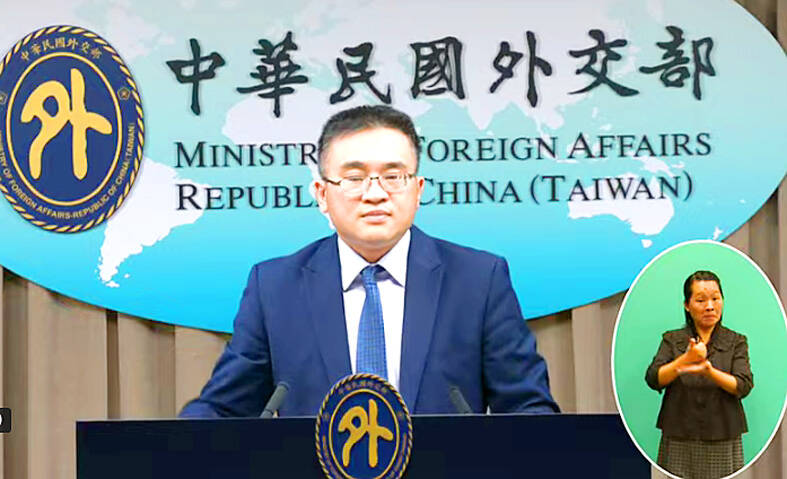The Ministry of Foreign Affairs (MOFA) yesterday slammed claims that Taiwan would become a “land of rapists” if Indian migrant workers are allowed into the nation and said they were attempts by foreign forces to intervene in Taiwan’s affairs.
Minister of Labor Hsu Ming-chun (許銘春) on Monday last week confirmed that Taiwan and India are expected to sign a memorandum of understanding before the end of this year on recruiting Indian migrant workers to Taiwan.
Since then, Taiwanese social media platforms have been inundated with inflammatory and derogative posts about the plan, MOFA said on Facebook, adding that such messages were misleading and harmed Taiwan’s international image.

Photo: screen grab from a Ministry of Foreign Affairs livestream
They also undermine efforts to promote warming Taiwan-India ties, it said.
MOFA is to meet with the India Taipei Association to clarify the misunderstanding, Department of East Asia and Pacific Affairs Deputy Director-General Chen Chuin-chi (陳俊吉) said.
Taiwan is a multiethnic country that respects human rights and is resolutely against discrimination or biased views against specific groups, MOFA said.
It urged the public to recognize cognitive warfare tactics and refrain from posting or forwarding false or misleading information.
It said that it hoped Indians who are part of the Milk Tea Alliance would not believe that the posts originated from Taiwan.
The Milk Tea Alliance started out as an online war of words between netizens supporting and criticizing China’s actions and policies and has grown multinational.

TPP RALLY: The clashes occurred near the Chiang Kai-shek Memorial Hall on Saturday at a rally to mark the anniversary of a raid on former TPP chairman Ko Wen-je People who clashed with police at a Taiwan People’s Party (TPP) rally in Taipei on Saturday would be referred to prosecutors for investigation, said the Ministry of the Interior, which oversees the National Police Agency. Taipei police had collected evidence of obstruction of public officials and coercion by “disorderly” demonstrators, as well as contraventions of the Assembly and Parade Act (集會遊行法), the ministry said in a statement on Sunday. It added that amid the “severe pushing and jostling” by some demonstrators, eight police officers were injured, including one who was sent to hospital after losing consciousness, allegedly due to heat stroke. The Taipei

NO LIVERPOOL TRIP: Taiwan’s Lin Yu-ting, who won a gold medal in the boxing at the Paris Olympics, was embroiled in controversy about her gender at that event Taiwanese boxer Lin Yu-ting (林郁婷) will not attend this year’s World Boxing Championships in Liverpool, England, due to a lack of response regarding her sex tests from the organizer, World Boxing. The national boxing association on Monday said that it had submitted all required tests to World Boxing, but had not received a response as of Monday, the departure day for the championships. It said the decision for Lin to skip the championships was made to protect its athletes, ensuring they would not travel to the UK without a guarantee of participation. Lin, who won a gold medal in the women’s 57kg boxing

‘NOT ALONE’: A Taiwan Strait war would disrupt global trade routes, and could spark a worldwide crisis, so a powerful US presence is needed as a deterrence, a US senator said US Senator Deb Fischer on Thursday urged her colleagues in the US Congress to deepen Washington’s cooperation with Taiwan and other Indo-Pacific partners to contain the global security threat from China. Fischer and other lawmakers recently returned from an official trip to the Indo-Pacific region, where they toured US military bases in Hawaii and Guam, and visited leaders, including President William Lai (賴清德). The trip underscored the reality that the world is undergoing turmoil, and maintaining a free and open Indo-Pacific region is crucial to the security interests of the US and its partners, she said. Her visit to Taiwan demonstrated ways the

The US has revoked Taiwan Semiconductor Manufacturing Co’s (TSMC, 台積電) authorization to freely ship essential gear to its main Chinese chipmaking base, potentially curtailing its production capabilities at that older-generation facility. American officials recently informed TSMC of their decision to end the Taiwanese chipmaker’s so-called validated end user (VEU) status for its Nanjing site. The action mirrors steps the US took to revoke VEU designations for China facilities owned by Samsung Electronics Co and SK Hynix Inc. The waivers are set to expire in about four months. “TSMC has received notification from the US Government that our VEU authorization for TSMC Nanjing